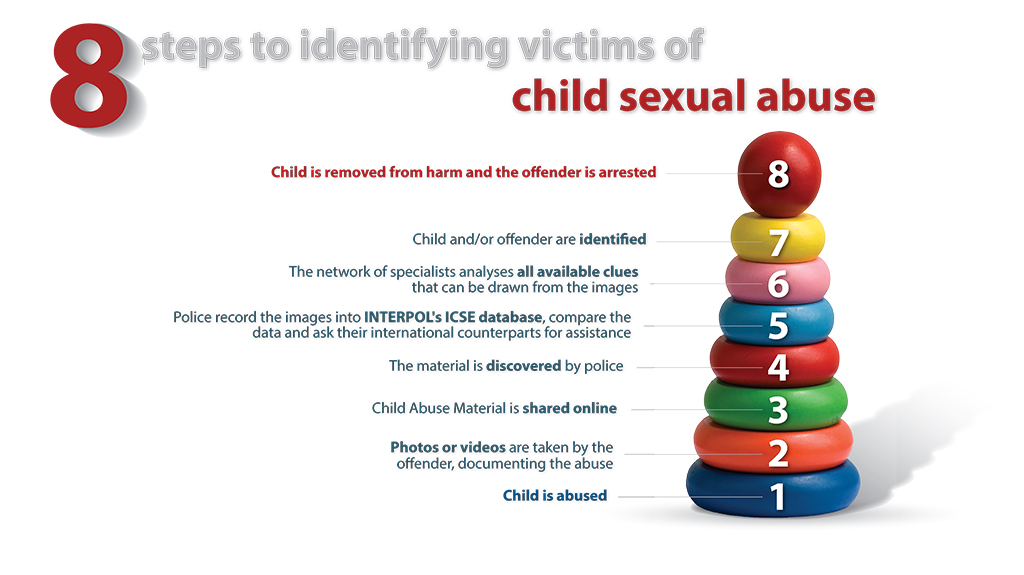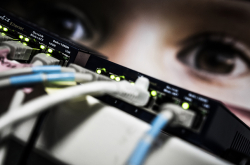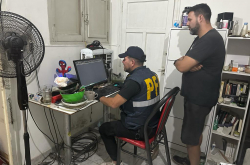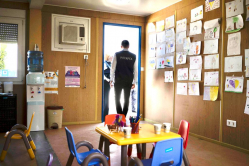Our main goal is to significantly reduce online crimes against children through engagement with our member countries. We build and reinforce the skills needed to investigate cases of online child sexual exploitation and abuse (OCSEA), identify victims, arrest offenders, and help ensure victims are supported throughout these processes.
We are working to achieve this goal by making the following activities a priority:
Victim identification
The identification of young victims depicted in sexual abuse material is a top priority for law enforcement, as it can also help locate the perpetrators.
Crucial to our work is the International Child Sexual Exploitation image database, which uses sophisticated image comparison software to make connections between victims and places.

Preventing the distribution of child sexual abuse material
Prevention of access to child material online is complementary to investigative work, and stops re-victimization of the children abused. We work closely with Internet service providers to block access to child abuse material online.
Appropriate terminology
Along with international experts, we recommend using appropriate terminology describing child sexual abuse or sexual exploitation. The Luxembourg Guidelines have been established as the reference for such terminology.
Training
A core function of our specialized experts in this area is to help police in our member countries to build their capacity to investigate child sexual exploitation.
We organize training courses in all regions of the world and covering the entire scope of child sexual abuse investigations:
- Conducting investigations in the online environment;
- The use of INTERPOL’s International Child Sexual Exploitation database;
- Victim identification methods;
- Victim and offender interview techniques;
- Categorization and triage of child sexual abuse material.
While many countries have child protection and special victims units, few have specialized staff able to investigate online child sexual abuse cases or perform victim identification. Our specialized officers can advise countries on how to set up victim identification units and can provide tailored support to national authorities.
Specialists Group on Crimes Against Children
The INTERPOL Specialists Group on Crimes Against Children meets annually to facilitate and enhance the investigation of sexual crimes against children. Gathering law enforcement, regional and international organizations, NGOs, the private sector and academia, the group identifies new trends and techniques and develops best practice.
The SGCAC draws attention to emerging issues and helps drive innovative responses. In the case of end-to-end encryption (used by criminals to conceal their illicit online activities), the SGCAC provided leadership to draft a resolution on safeguarding children against online sexual exploitation , which was unanimously adopted at the 89th session of the INTERPOL General Assembly in 2021.
Almost 200 participants took part in the 40th SGCAC operational meeting in March 2024, representing 68 national law enforcement, government, regional and international organizations, the private sector, NGOs and academia. They discussed global efforts and technical solutions to fight online child sexual abuse, identify victims and their attackers, and disrupt criminal networks involved in producing and circulating abusive content.
Travelling sex offenders
Some sex offenders will cross borders to abuse children, allowing them to stay out of sight of their home authorities and gain unsupervised access to children.
INTERPOL can issue a Green Notice to warn about a person’s criminal activities, where the person is considered a threat to children, or a Blue Notice to collect information on a person’s identity, location or activities in relation to a crime.
Missing, abducted and trafficked children
At the request of a member country, we can issue a Yellow Notice to help locate missing persons, especially minors. These notices are circulated on an international basis and recorded in our database of missing and abducted children.
We also work closely with our member countries and partners to protect minors from being trafficked and exploited for labour.
Partners
We nurture relationships with a number of cross-sector partners in order to cast the widest possible net against sex offenders.
- Safe Online
- UNICEF
- Home - ECPAT
- The Human Dignity Foundation
- INHOPE
- International Justice Mission
- Internet Watch Foundation IWF
- WeProtect Global Alliance
- Virtual Global Taskforce
- National Center for Missing & Exploited Children
- Regional law enforcement organizations
- Thorn
Private sector partners such as financial institutions, internet service providers and software developers also play a crucial role in tracking child sexual abuse material and shutting down illegal distribution channels. Their input is highly valued and a key part of our coordinated approach.











